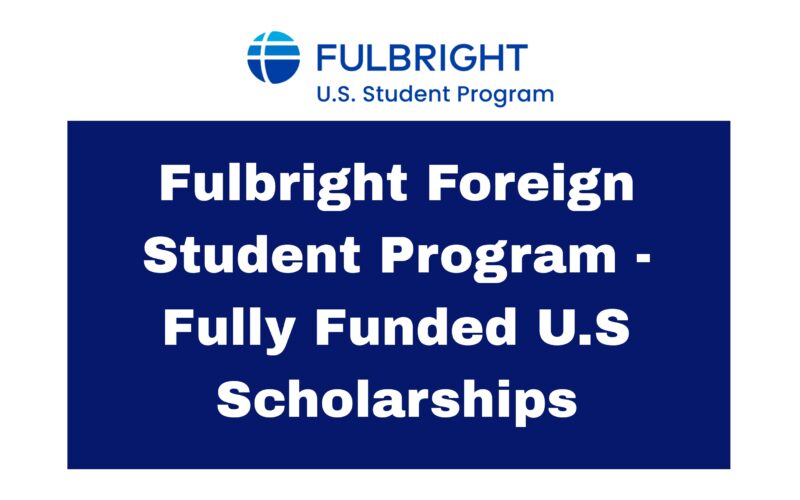The Fulbright Foreign Student Program is the U.S. government’s flagship international scholarship, offering fully funded master’s and PhD study or research opportunities at top universities in the United States. Open to students from over 160 countries, Fulbright covers tuition, airfare, living costs, research support, and even visa services.
If you’re a future researcher, changemaker, or global leader, Fulbright is more than a scholarship—it’s a launchpad for international impact and academic excellence.
Why Choose the Fulbright Scholarship for Graduate Study?
Fulbright is widely recognized as the most prestigious U.S. graduate scholarship for international students. Here’s why:
- Full academic access: Study in top-ranked U.S. institutions, fully funded
- Cultural exchange: Serve as a global ambassador while studying in the U.S.
- Elite network: Join 400,000+ alumni, including Nobel Laureates and world leaders
- Career acceleration: Open doors in academia, diplomacy, research, and global development
“Fulbright gave me the chance to turn research into global impact—and become a voice for my country.” – Daniel R., Colombia
What Does the Fulbright Foreign Student Program Cover?
Unlike scholarships that only fund tuition, Fulbright offers comprehensive financial and academic support:
- Full tuition and academic fees
- Monthly stipend (for housing, food, and transportation)
- Round-trip international airfare
- Health and accident insurance
- Research and book allowances
- J-1 visa processing and embassy assistance
- Access to U.S. conferences, mentorship, and leadership training
Visit the official Fulbright website for details.
Who Is Eligible for the Fulbright Program?
Eligibility varies by country, but most applicants must:
- Be a citizen of a Fulbright-eligible country (160+)
- Hold a Bachelor’s degree (for Master’s) or a Master’s (for PhD applicants)
- Demonstrate English proficiency (TOEFL/IELTS)
- Show academic excellence and leadership potential
- Intend to return home after completing the program
Priority is often given to:
- Women in STEM
- Students from underrepresented regions or marginalized backgrounds
- First-generation university students
- Refugees and displaced applicants
How to Apply for the Fulbright Scholarship—Step by Step
| Step | Description |
|---|---|
| 1 | Visit your local U.S. Embassy or Fulbright Commission website |
| 2 | Review country-specific deadlines and eligibility |
| 3 | Prepare application (essays, transcripts, test scores, references) |
| 4 | Apply through your country’s Fulbright portal |
| 5 | Attend interviews if shortlisted |
| 6 | Final selection & university placement (handled by IIE) |
Fulbright Scholarship Requirements—Documents You’ll Need
- Academic transcripts and certificates
- TOEFL or IELTS score (if required by your country)
- Two essays: Statement of Purpose + Personal Statement
- Three letters of recommendation
- Updated CV or academic resume
- Portfolio (for applicants in creative/arts fields)
Fulbright Application Timeline (Typical Year)
| Phase | Dates |
| Applications Open | February–May |
| National Interviews | June–August |
| U.S. Review & Matching | September–December |
| Visa & Pre-departure | March–June (following year) |
| Program Start | August–September |
Always confirm dates on your country’s Fulbright Commission or Embassy website.
How to Win the Fulbright: Top Tips from Past Scholars
- Tell a story. Your essays should show clear purpose, resilience, and community impact.
- Align with Fulbright values: Highlight how your goals support international understanding.
- Start early: Applications take 3–6 months to prepare well.
- Secure strong recommenders: professors or mentors who know your academic drive.
- Leverage alumni: Attend local Fulbright info sessions or panels.
Specialized Fulbright Opportunities by Region
| Region | Programs |
| Africa | Mandela Washington Fellowship, African Research Scholar Program |
| Asia-Pacific | Fulbright-Nehru (India), Fulbright Taiwan (tech, education) |
| Middle East/North Africa | Fulbright Egypt (STEM), Fulbright Jordan |
| Latin America | Fulbright Brazil, Fulbright Mexico (cross-border innovation) |
Find your country’s Fulbright portal here.
FAQs—Fulbright Foreign Student Program
Q: Is Fulbright fully funded?
Yes. It covers tuition, airfare, stipends, visas, insurance, and more.
Q: Can professionals apply?
Yes. Fulbright accepts mid-career professionals, artists, researchers, and journalists.
Q: Can I apply with my family?
Some programs support dependents via the J-2 visa (check your country’s options).
Q: Do I need GRE scores?
Only if required by your selected U.S. university. Many programs no longer require the GRE.
Q: What if I don’t get selected?
Reapply next year. Many Fulbrighters were accepted after 1–2 attempts.
Should You Apply for Fulbright?
The Fulbright Foreign Student Program is more than a scholarship—it’s a life-changing global opportunity. With full funding, top-tier academics, and a network of leaders, Fulbright helps you study in the U.S. while shaping your ability to lead change at home.
Apply boldly. Think globally. Lead purposefully.
Related Content
- Fulbright Application Guide
- Fully Funded Scholarships for International Students
- Government Scholarships for Developing Countries
- Women in STEM Scholarships (Fully Funded)
